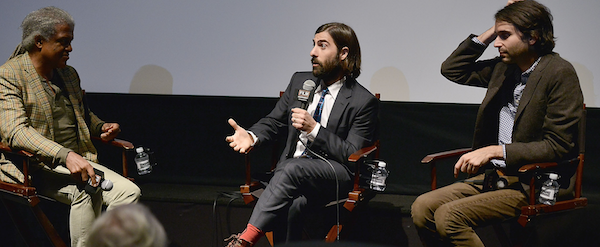Last night Film Independent Members were treated to a free screening of Spirit Awards alum Alex Ross Perry’s new film, Listen Up Philip. Channeling the neurotic and idiosyncratic style of comedy from the 70’s, Philip features Schwartzman as an arrogant, selfish writer who can’t seem to maintain his romantic relationships, isn’t interested in promoting his latest book and has a nasty habit of saying whatever the hell he wants, whenever, to whomever. Perry’s third feature stays true to his form of exploring characters that are not necessarily heroic or even likeable, but remarkably flawed and human. After the feature, Film Independent Curator Elvis Mitchell sat down with Perry and actor Jason Schwartzman to discuss their “romantic” first meeting, the unapologetic nature of this type of storytelling and Perry’s rule-bending, anti-Hollywood screenplay. Mitchell opened the dialogue by asking how the two had first met. Perry joked that Schwartzman should tell the story because it becomes a romance when he tells it. Schwartzman obliged and described a “six-and-a-half hour date,” which entailed dinner at Angelica’s Kitchen in NYC, then going for a drink, followed by vegan ice-cream. Perry admitted that his previous works, made on a micro-budget with friends, “didn’t qualify him to be meeting with the likes of Jason.” Perry also didn’t know if Schwartzman would be interested in the role since he had already played a writer in a few other projects. Quite the contrary, Schwartzman spoke of how much he loved the screenplay and was drawn to the directness of Philip’s character, mainly because you don’t get to be that honest in real life. Casting the role of Philip was crucial, and it took a performer like Schwartzman to bring a “light-hearted twinkle” to a character that abrasive. The filmmaker felt he found the perfect actor to make sure the film’s mood wasn’t too dark, and make his leading man a “charming, likeable asshole.” The film co-stars Elisabeth Moss as Philip’s current girlfriend; Jonathan Pryce as Ike, a successful author he befriends; and Krysten Ritter as Ike’s daughter. While jokes are cracked, tears also are shed, and Perry utilizes extreme close-ups on more than one occasion, bringing the audience as close to the characters as possible. Schwartzman admitted that while it was fun to play a character this brutally honest, there were scenes that were challenging–especially when he was shooting with Moss. He said sometimes his dialogue would cause Moss to cry, even if it wasn’t scripted, and he felt bad because she’s “the sweetest person ever.” Philip’s narrative shifts between the title character, to Moss’ and Pryce’s. Perry alluded to the fact that this was something you probably could only get away with as an independent filmmaker, as a studio would have wanted to change much of his script and the way he transitioned between the characters’ individual stories. Perry’s screenplay is unconventional in several ways, particularly its length and that it is packed with much more information than the Hollywood standard. Schwartzman admitted he had never read anything like it, and compared it to a novel, while Perry said the film’s cinematographer asked why there were so many details in the script that didn’t pertain to visuals. He wrote in such details so every department would know how to prepare for the scene and also because he wanted to write something that served as more than just a blueprint. “Information is fun,” said Perry, adding that he wanted to write a script he was proud of, that could be bound and put on a shelf. In screenwriting you are also taught that your main character has to be likeable and someone the audience can root for, but Perry wasn’t concerned with that and says it’s all about committing 110% to your vision and the type of story you are trying to tell. He mentioned being inspired by the films of Paul Schrader, and lonely, distraught characters. “It goes beyond whether characters are likeable,” he said, noting that he’s drawn to the idea of portraying characters who are going through a really difficult time. He’s inspired by cinema that bookends a period in a character’s life, where you get dropped in to experience what they’re going through during that time. Schwartzman offered a metaphor for this type of storytelling, saying that you get on the freeway at the speed of traffic and that’s how you have to come on board as an audience member. Listen Up Philip is playing in select theaters and is currently available on iTunes. Chris Lombardi / Film Independent blogger
